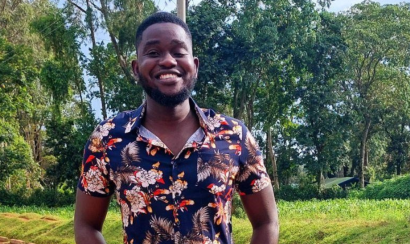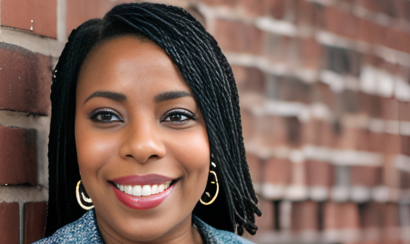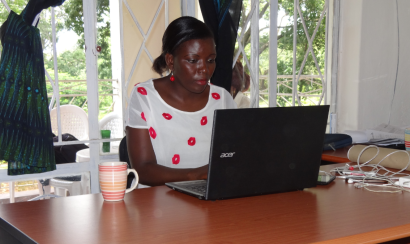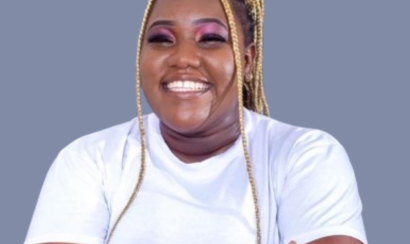My Journey into One Acre Fund: Jane Uweh
Jane, who leads our mass marketing work in Rwanda, joined us at the height of the pandemic in 2020. This wasn’t the only adaptation she had to make during this period - she also relocated from her home country, Nigeria, to pastures anew in Kigali. We sat down with her to learn more about how she handled this transition, how her first few months at One Acre Fund have been, bonding with her new teammates, and more.

Could you describe what you do at One Acre Fund?
I lead Mass Marketing and Radio Advertising in Rwanda. I help different teams to drive lifestyle and behavior changes using mass outreach platforms such as radio. My work is impact-oriented; for example, I’ll work with the nutrition team to encourage farmers to eat and feed their families healthier foods, or the field team to promote row-planting and crop spacing for better yields.
What were you doing before joining One Acre Fund?
I was a communication strategist with RDF Strategies, a corporate communications agency in Nigeria. I simultaneously held the same role for the African Women on Board (AWB), a nonprofit associated with RDF that champions African women and girls who aspire to lead their workplaces, communities, and governments. AWB also matches female professionals with mentors and sponsors across multiple industries on the continent. The biggest difference between my current role and my previous posting is that at One Acre Fund I specialize as a mass marketer, which is just one aspect of communication.
What made you decide to apply for a job with One Acre Fund?
I wanted a chance to apply my passion and skills for communication and marketing to pursue social justice. I used to practice general communication and craft strategies whose outcomes I didn’t get to see. Now I am much closer to ‘the action’ — creating and witnessing the impact of my role. I have close personal relationships with the people I work with, including farmers, and I see firsthand the transformation of lives in my current role, which is immensely fulfilling.
How did you find the application process?
When I saw the advertisement for my role on LinkedIn in early 2020, I had already had a conversation with my previous employer about my desire to drive the impact of our work through executing our boardroom strategies in real-world scenarios. When I studied the role’s requirements and did some personal research on the organization, it seemed like the perfect opportunity for me. So I applied and started the placement process, which took me three months. I went through the entire interview process online because of COVID travel restrictions and got the job. It was an involving experience, which, reflecting upon it now, gave me an almost complete picture of what to expect.
What has your experience been like in the past year? Is One Acre Fund/the role what you expected?
Trying to get the entire scope of my role from an outsider’s lens, I didn't understand just how much work goes into ensuring farmers get the return they deserve for the work they do. There are many projects going on simultaneously and so many different teams working together, and you don't realize how interrelated everything is until you get in. In that sense, it's a bit more than I thought, but in a fulfilling way. I thought I was coming in to do radio marketing, but I'm working with different departments like Nutrition, Field Operations, and Impact, among others, to drive impact. I am doing a lot more than I thought I would; it is inspiring. We don’t do projects to fill some quota; we work to improve livelihoods. I am regularly involved in conversations about how a project will create impact — and abandoning it if it won’t — and that is such a refreshing outlook on the meaning of work.

One of our Field Officers takes a farmers' group through a training session in Malawi.
What’s been the most challenging part of starting a new job during a pandemic?
The remote working bit. I am happy to work from home mainly because it is a familiar concept. But starting a new job where you do everything remotely, especially in a role that requires me to be in contact with farmers to know how to structure response models, has been a challenge. I look forward to being able to interact with farmers more.
I think it is important to meet our clients in their typical environments whenever possible: in their farms, attend the trainings we give them, hold conversations with them and understand their worldviews. While working remotely, I’ve always thought about ‘Going to Gemba’ — where mostly office staff go to the field to see farmers and field staff at work — because I know that nothing beats personal experience. Even when executing our various roles, working physically with people has some unique advantages over working from home. For example, remote working slows down processes quite a bit. Conversely, when working from the office, I can easily walk to a colleague’s desk and get urgent information I need instantly instead of emailing and hoping they respond quickly.
Has your on-the-job experience made it any easier?
In a way, yes. When I started, I was working from my home country, Nigeria. I eventually moved to Kigali, Rwanda, which, of course, brought me closer to some of our clients. It is also beneficial that many of my colleagues make an effort to stay in touch and carry one another along on whatever we are doing. Working from home is a joy because we can choose the most productive hours and avoid wasting valuable time in traffic. Still, we need to balance that concept with meeting physically with our teammates whenever possible.
What lessons have you learned changing careers during COVID?
When you are genuinely passionate about something, just go for it. We often want to stick with the familiar, but we can also thrive in the unfamiliar. When COVID arrived, it brought a level of uncertainty many of us hadn’t experienced before. I knew that working to drive social justice and creating impact would make me happy, so I moved to Rwanda to do just that, and it is working out.
What are you doing to stay connected with our goals and mission in a year of distance?
The nature of our organization and culture is that we work through meetings, so there is always the opportunity to interact, consult with and learn from colleagues who’ve been in the organization longer. Many resources are available to employees, which are great for building fluency in our policies, culture, and goals. I’ve also found our colleagues closest to farmers — the field team — to have valuable information that often aids our office work. One of our team goals this year is to be better with knowledge sharing, so I find it helpful to stay in touch with the people I work with. Lastly, small team calls, like check-ins, and our periodic org-wide meetings, like Town Halls, are perfect opportunities to learn about and ask questions regarding our mission and culture. We’ve done a great job of availing opportunities for the whole team to interact and keep everything going.



